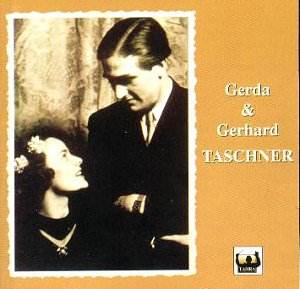The last few years has seen an explosion of interest
in Gerhard Taschner. A biography, re-issues of his Odeon 78s of the
early 1940s and a number of broadcast performances including major concerti
and work with august collaborators, such as Gieseking, has furthered
our knowledge of his musicianship. His career was truncated and he died
regrettably young at fifty-four, though his active concert-giving career
had trailed off significantly before his death in 1976.
He made his first recordings for Odeon as a young man
of nineteen in war-torn Berlin. Of the eighteen discs that he made ten
are presented in this husband and wife disc devoted pretty equally to
Gerhard and his wife Gerda, herself a talented pianist. Two of the Odeons
include the only sides recorded by Gerhard and Gerda as a duo. His Chaconne,
a massive and etiolated performance, is the work of a serious-minded
young man whose devotion to Bach is not matched as yet by a sense of
architectural responsibility. I’ve previously reviewed a slightly later,
1943 radio broadcast of Taschner’s Chaconne and I thought that was
slow, but this November 1941 performance stretches to a brain curdling
fifteen and a half minutes. His articulation is abrupt, his view romanticised
to breaking point, vibrato intensified in contrastive moments to present
an entirely spurious almost Schumannesque schizophrenia. Italicisation
of phrasing is extreme, the tone not especially beautiful – steely and
undernourished – the conception static, lurching from bar to bar, entirely
introspective with hints of an idée fixe about certain structural
moments, a kind of proto-Franckian one. Well, I am sympathetic to the
concentration and to the powerfully self-absorbed seriousness that Taschner
so enormously conveys and to his relative youth and other maybe external
circumstances – but this can’t, except in a psycho-biographical sense,
be taken as a coherent statement.
The Handel, a recording made two years later, is thankfully
slightly better. He has a nice even trill but a fluttery vibrato that
is not under perfect control. Cor de Groot (what was he doing in Berlin
in 1943?) makes his sonorous presence felt as an accompanist but Taschner
is more grandiloquent than Affettuoso in the first movement and again
very slow with more italicised phrasing, too prayerful at the end of
the movement; the final cadence really does take an age. The second
movement Allegro really isn’t sprung – as a young orchestral leader
he hadn’t yet learnt the trick of conveying internal rhythm. His preparation
for the ritardando is very laboured and the final sudden gush of vibrato
intensification leadenly predictable. There are some good things in
the Larghetto, if sentimental ones and the lack of dynamic variance
in the finale with its clipped articulation somewhat wearying. This
is a Sonata that, spurious or not, fared well on 78s. Thinking of Szigeti,
Menges, Telmanyi and Goldberg amongst others makes it clear that Taschner
was simply not in or approaching that league.
There’s some rather worn sound on the disc of the 1942
Sarasate. It’s a suave, rather over-nuanced performance and not especially
likeable. The Paganini, from the same session, again with his wife at
the piano is not so bad – as Klemperer might have put it. The pizzicati
are good, and there’s rather more animation than was his then youthful
wont but equally there’s no real spark. The disc is rounded out with
a substantial and very big boned and weighty performance of the Piano
Concerto in D given in Leipzig by Gerda Taschner with the Leipzig Radio
Symphony Orchestra under the direction of Hermann Abendroth, one of
only two performances they gave together (the first time in the 1930s
was of the Chopin second concerto). Serious and spacious, with orchestration
of almost Brahmsian weight, this is a frequently grim and rather granitic
traversal. She plays the Reinecke cadenzas however with real verve and
in the Romance second movement fuses poetic introspection and dramatic
extroversion with good results – taking care over her articulation.
No-one can fault Tahra’s dedication to the Taschners
– and the disc begins with a little two-minute spoke reminiscence by
Gerda, still living in Berlin at the time of writing (2003) I believe.
This disc catches Gerhard at the very outset of his career and one should
not expect too much.
Jonathan Woolf
